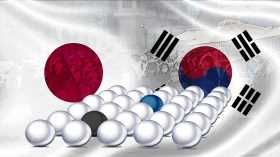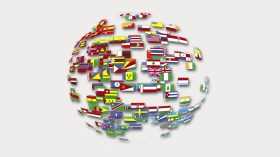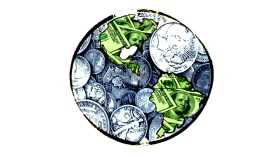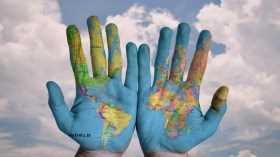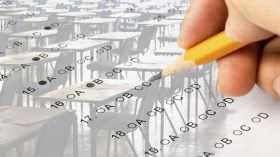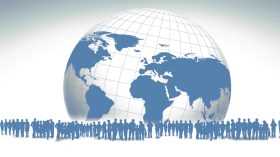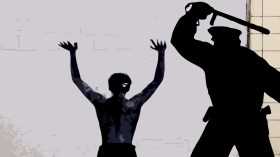
Is national identity at risk? At LSE we discuss if multiple overlapping identities (e.g. transnational, regional and local) erode nationalism and patriotism
The Lectures
Professor Michael Bruter, using a rigourous and systhematic approach to qualitative political science research, demonstrates that national identities are layered, contingent and changeable. He also explores the interplay between national identities and European identity in EU member states.
Dr Mathijs Pelkmans following an ethnographic approach, explores the ways in which nationalism can unite and divide people in the context of globalization and when state borders change. Drawing on his field work in a village on the border between Georgia and Turkey, Dr. Pelkmans explains how nationalism is manifested in people's behavior and the perception of the "other."
Multiple identities and nationalism
There has been much discussion about the conflict or complementarity existing between different kinds of identities. A transnational form of allegiance, such as "Europeanness," religious and class identities have played a very important part in both historical and contemporary social and political events. These transnational identities overlap with people's national identities and have a great psychological impact in defining their values, attitudes, believes, and lifestyle concerns. Could they also affect the sense of patriotism? Someone may, for instance, feel Muslim, Jewish or Christian as strongly as she feels French, Italian or American. Class and political affiliations have been also historically very strong and have often trumped national identification. For example, during the Spanish Civil War there were many volunteers from many different nationalities fighting on both camps due to a sense of political and class solidarity. Similarly, despite the institutional and political crisis, many share a strong European identity. Migration and mixed marriages have contributed to the phenomenon of transnationalism.
Additionally, state-centric nationalist or patriotic feelings may be, arguably, diluted or weakened by local and regional identities. These other types of identities are also grounded on a specific territory and can be sometimes considered as important as the national identities. Localism and regionalism thrives in particular in societies with low geographical mobility where people attach great importance to the language, traditions, folklore, and other cultural manifestations of their village, town or county or region. The growing importance of cities as loci for identities in a increasingly urbanised world should also be taken into consideration, places such as New York, London or Paris may evoke a strong sense of identity among those who live or have live part of their lives in them. The regional identity is sometimes so strong that it lead to strong claims for political autonomy and even conflict within states. In countries such as Belgium, Bolivia, Canada, India, Italy, Spain, and the UK, the identification with the region of origin is often as strong as that with the country. Some people find Quebecois, Scottish, Flemmish, Catalan and Basque identities at odds with their Canadian, British, Belgian or Spanish ones. Others feel perfectly comfortable living with multiple overlapping identities.
However, has the importance of localism, regionalism and transnationalism been overstated? Are these multiple identities really trumping nationalism? Recent calls for a "Brexit" and the rise of nationalist movements across not just Europe, but the world more generally, hints at the continued importance of nationalism as a force of identification, mobilization and loyalty. Local and regional identities are sometimes considered the building blocs of national identities. Moreover, the process of political and economic globalization as well as the increased migration flows may be construed as triggers for the re-emergence of nationalist movements across the world.
Recommended readings:
- Bruter, Michael (2005). Citizens of Europe – the emergence of a mass European identity. London: Palgrave Macmillan (book)
- Downing, Joseph. (2015) "Understanding the (Re)Definition of Nationhood in French Cities: A Case of Multiple States and Multiple Republics," Studies in Ethnicity and Nationalism Vol. 15, No. 2, October 2015 (article)
- Pelkmans, Mathijs. (2006). "Lost Relatives" In Pelkmans, Mathijs Defending the Border: Religion, Identity, and Modernity in the Republic of Georgia. Chapter 3. pp.71-87. Ithaca: Cornell University Press (book)
- Williams, Kristen and Neal G. Jesse (2003) "Resolving Nationalist Conflicts: Promoting Overlapping Identities and Pooling Sovereignty—The 1998 Northern Irish Peace Agreement," Political Psychology Vol. 22, No. 3, September 2001 (article)
Watch this very interesting videos on European cultural identity and French national identity:
If you change your mind, you can change your vote simply by clicking on another option.
New to netivist?
Join with confidence, netivist is completely advertisement free. You will not receive any promotional materials from third parties.
Join the debate
In order to join the debate you must be logged in.
Already have an account on netivist? Just login. New to netivist? Create your account for free.
You are viewing a filtered list of comments. Click the button above to view all comments.
MY HERPES STORY AND HOW I WAS CURED
For years, I struggled with the emotional and physical burden of the herpes virus, believing I would have to live with it forever. I tried countless treatments, medications, and therapies, but nothing seemed to bring lasting relief. It felt like a battle with no end in sight until I discovered a natural remedy that changed everything (herbs). Skeptical at first, I decided to give it a try, and to my surprise, I started noticing improvements in my overall well-being within two days of taking the medication. With consistency as prescribed by the herbal doctor, I felt healthier, more energized, and free from the symptoms that had once controlled my life. After completing the treatment, (14days) I visited my doctor for confirmation, and I was overjoyed with the results. I tested negative. I was cured from my HSV1&2
This experience has given me back my confidence, peace of mind, and a renewed sense of hope. If you or someone you know is struggling with herpes or other health concerns like HPV, endometriosis, ovarian cysts, PCOS, or hepatitis, know that there are alternative options available and you will be cured. For those seeking a natural approach to wellness, I encourage you to explore this path with an open mind. You never know how life-changing it might be. Just if you want to reach out, you can contact:
Email: dr.awaseherbalhome@gmail.com
WhatsApp: +2349074997110
Join the debate
In order to join the debate you must be logged in.
Already have an account on netivist? Just login. New to netivist? Create your account for free.







